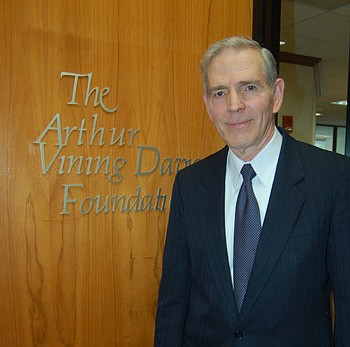
Before he became executive director of the Arthur Vining Davis Foundations, Jonathan Howe had already logged almost 36 years of service to his country.
Following graduation with honors from the U.S. Naval Academy in 1957, Howe embarked on a career that included sea assignments and commands on nuclear submarines and surface warships.
He was commander in chief, Allied Forces Southern Europe in Naples, Italy, and commander, U.S. Naval Forces Europe in London.
Howe also served as chief of staff, Seventh Fleet in Japan, and deputy chairman of the NATO Military Command in Belgium.
Stateside, Howe was a national security adviser to presidents from Richard Nixon through George H.W. Bush.
After retiring from the Navy in 1992, Howe served for a year in Somalia as the special representative of the secretary-general of the United Nations.
It was while Howe was in Europe in 1991 that he was recruited to join the foundation by his predecessor, Max Morris, who also was a retired admiral.
“He came over and told me about this job. He said ‘you won’t be in the Navy forever,’” said Howe.
When it was time to retire from the service, Howe said he made the decision to come to Jacksonville and the foundation because “it met my criteria for the next phase in my life.”
“I wanted to stay in service, but I wanted to get away from Washington and I wanted to live where I could be part of a community,” he said.
In addition to his second full-time career, Howe is chairman of the World Affairs Council of Jacksonville, chairman of the board of Fleet Landing and he’s a past president of the Rotary Club of Jacksonville.
The work of the Arthur Vining Davis Foundations is visible to most people through its support of public television, including the work of filmmaker Ken Burns and many educational programs.
The foundations also support programs and institutions in the fields of health care, religion and secondary and higher education.
Arthur Vining Davis is no relation to the locally well-known Davis family of Winn-Dixie fame. Born in Massachusetts, he was a minister’s son who eventually became president and chairman of the board of the Aluminum Co. of America (Alcoa). In 1957, he was listed as the third-richest individual in the world.
Following his retirement in 1958, Davis, like Howe, began another career. Davis became a real estate developer with substantial holdings in Florida.
In 1961, his company merged with Jacksonville-based Stockton, Whatley, Davin & Co. to form a partnership that would lead to Arvida Corp., the developer of Ponte Vedra.
When Davis died, part of his estate was the creation of the foundations. Since its formation in 1966, the philanthropy has granted more than $260 million to foster many forms of education, with a focus on programs that live long past their grants.
In addition to the leading public television stations, grant recipients include seminaries and colleges from small specialized institutions to the California Institute of Technology and Stanford University.
The foundations also have supported the University of North Florida and Mayo Clinic in Jacksonville. Recent areas of interest for the foundations are environmental issues and programs to promote interfaith understanding and tolerance.
“It’s not feeding the hungry. It’s trying to preserve institutions,” said Howe.
Is leading a major philanthropy with a national scope anything like commanding military forces all over the world? Howe said in some ways it’s different and in some ways similar.
“It’s a different mission and a different objective, but you can’t sit back. You have to constantly question yourself. What’s our impact? Are we making a difference?” he said.
356-2466